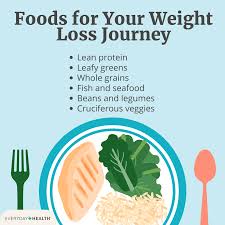Over the years, you’ve probably heard your fair share of wacky weight loss recommendations, whether it’s to drink celery juice every day or replace your meals with weight loss “cookies.” While there’s an abundance of misguided advice, there are also many legitimate, research-backed tips for people who are in the right mental health space and have weight loss as a personal goal.
We consulted nutritionists, registered dietitians, personal trainers, and other professionals to bring you the most effective and usable weight-loss tips. Here are 25 science-backed and expert-approved tips to help you achieve and sustain a healthy weight.
An Easy Tip to Cut Back on Fat While Cooking
Chef Daniel Green teaches you how to reduce fat using this simple cooking trick.

- Eat Slowly
I teach my clients how to select foods they enjoy, actually taste each bite entering their mouths, and chew consciously. I instruct them to chew slowly, swallow only when the food is completely chewed, and do it again. It takes time to know we’re full. Eating slowly not only lets us savor our food but provides us with better satiety cues.
— Janet Zinn, a private-practice psychotherapist and licensed clinical social worker in New York City
- Enjoy the Food You Eat
“So frequently we’re advised on what to eat, then when we dislike that particular food, we’re less likely to form healthy long-term habits. Experiment with different fruits and vegetables. Discover ways to cook new dishes that bring variety and flavor. Incorporate herbs and spices to add zest.”. Or if not, enjoy the sweetness of fresh fruit and depth of raw and steamed veggies. There’s no reason why your relationship with food can’t be enjoyable.
— Janet Zinn
- Daily Gratitude Journal
“Our diets are sometimes associated with our mood, whether consciously or unconsciously. When stressed, we’ll often use foods to assist with coping with it.”. I work with clients on maintaining a daily gratitude journal of things they are thankful for — or even just a journal to write in when they’re stressed — so that they are more equipped to handle the stress by recognizing it and using other resources, as opposed to grabbing food as a means of coping.”
— Lauren Manganiello, RD, CSSD, a private practice board-certified sports nutritionist and registered dietitian in Long Island, New York
Having the correct tools can play a huge role in your weight loss journey. Take a look at our expertly curated list of the best weight loss apps to assist you in staying on track, reaching your goals, and attaining your fitness goals.
- Batch Cook and Prep
“Each Sunday I cook my week’s worth of meals in advance. For breakfast, I mix oats, peanut butter, flax, and protein powder so I just add water and microwave. I also make lunches for the week and place them in separate containers so I can take one a day to work with.”
— Kyra Williams, a Boston personal trainer
- Don’t Forget the Weights
“Be sure you are lifting weights or another type of strength training two or three times a week. Lifting moderate to heavy weights — three or four sets of 10 to 15 reps using weights that strain your muscles — increases your muscle mass.”. When you carry more muscle on your body, the food you consume is more likely to be used as fuel, instead of being stored as fat. Studies also indicate that resistance training can enhance a weight loss regimen.”[1]
— Kyra Williams - Get Enough Z’s
“Sleep deprivation raises your hunger hormone, ghrelin, and lowers your satisfaction hormone, leptin, which can lead to weight gain.”. When we are tired, we want to eat more salty and sweet food. Why? Because whenever you’re hungrier, your desires for more energy — i.e., more calorie — foods are greater. We also understand that how we think and process our feelings is compromised by poor sleep, so it’s simple to relate this to a compromised ability to make sensible decisions in most aspects of life, including with food. If we turn the coin around, we can reasonably believe that when we are well rested, our bodies function better. When it comes to food, that would translate to us eating when we are really hungry and eating only until full.
— Angela Lemond, registered dietitian-nutritionist in private practice in Texas
- Don’t Skip Meals
“Remember, our body’s ultimate goal is to stay alive. As soon as we are being kept from calories, which are literally the life energy for our bodies, it will do things to survive.”. Our body is aware of what foods contain more energy density, and we will have more cravings for them. Respect your hunger and do not make your body feel like it’s being starved. Studies indicate that the advantages of fasting — such as a possible reduction in LDL (“bad”) cholesterol — generally evaporate once the fast is ended.[2] This contradicts most dieting strategies, but those strategies really don’t do much for individuals in the long run. I usually suggest consuming every four hours.”
— Angela Lemond - Stay Hydrated
“Studies have discovered that individuals who had two glasses of water before a meal lost more weight than individuals who did not have water prior to meals — and they were able to maintain it.[3] This is a simple trick that serves a double purpose. Thirst can disguise itself as hunger, and you end up consuming more. And water fills you up, and you take less with your meal.”
— Megan Casper, RDN, a nutrition counselor and the founder and CEO of Nourished Bite - Cut Calories, Not Flavor
“With flavorful ingredients, a little goes a long way, so you end up reducing the calorie content of meals without sacrificing taste. By choosing options such as sharp cheddar over mild cheddar, you can use less, but you’ll still get a lot of flavor without feeling like you’re on a diet.”